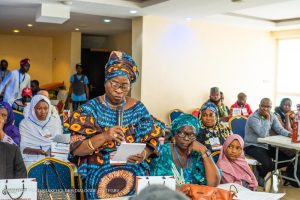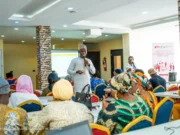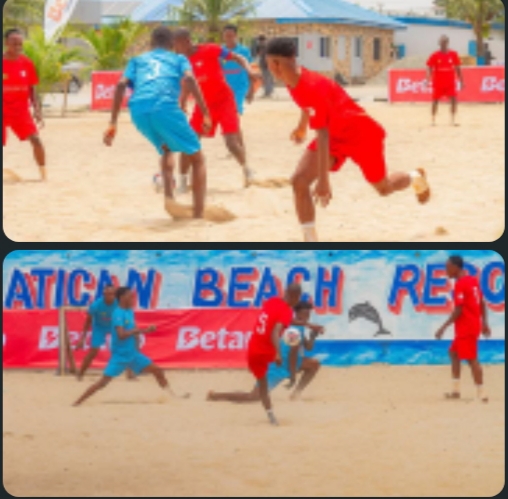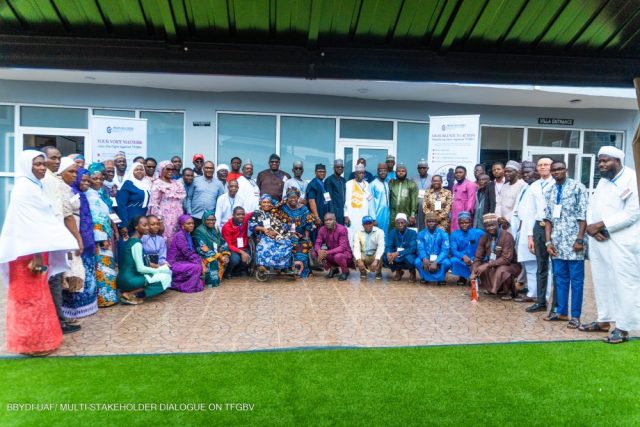The tragic death of 21-year-old Hafsoh Lawal, a student in Ilorin who was lured and murdered through social media, has sparked a decisive movement to address the growing threat of Technology-Facilitated Gender-Based Violence (TFGBV) in Kwara State.
On Saturday, leaders from government, religious institutions, civil society organisations, security agencies, and community groups gathered at Sinclair Hall, Ilorin, for a high-level dialogue themed “From Silence to Action: Mobilizing Ilorin Against Technology-Facilitated Gender-Based Violence”.

The event, convened by the Brain Builders Youth Development Initiative (BBYDI) with support from Urgent Action Fund-Africa, marked the first coordinated response in Kwara State to the alarming rise in digital abuse targeting women and girls.

In her welcome address delivered by Ruth Adeosun, BBYDI’s Finance and Policy Officer, the Executive Director, Barrister Nurah Jimoh-Sanni, described the forum as a pivotal moment for the community to shift from grief to action.
“Hafsoh’s story is tragic — but sadly not unique. Women and girls across Kwara, Nigeria, and Africa are being harmed in ways our systems are still struggling to address. What makes today different is that we have chosen not to remain silent,” Jimoh-Sanni said.

The dialogue brought together a cross-section of stakeholders, including representatives of the Council of Ulama, Christian Association of Nigeria (CAN), government agencies, civil society groups, and persons with disabilities. The purpose: to jointly design a Charter of Commitments that outlines practical, sector-specific steps for preventing TFGBV in Kwara State.
The carefully structured programme included an ice-breaker, context-setting presentations on TFGBV realities in Ilorin, an interactive plenary discussion, and a Co-Creation Exercise where stakeholders crafted actionable commitments specific to their institutions. Participants discussed not only the unique dangers women and girls face online but also systemic failures and societal attitudes that enable these harms.
In the moderated group sessions, religious and community leaders examined how faith-based institutions can reshape harmful narratives, promote online safety, and publicly denounce digital abuse from the pulpit. Government agencies and CSOs discussed reforms needed in law enforcement, survivor support services, and public education.

The dialogue also emphasised accountability and sustainability: a 10-member Joint TFGBV Response Committee was inaugurated to drive implementation, monitor progress, and maintain momentum after the event. Each sector nominated representatives to the committee, ensuring broad-based ownership and leadership.
“We can no longer pretend this is an isolated problem,” said Sanni Alausa-Issa, one of the session moderators. “From family homes to mosques and churches, to police stations and classrooms — every institution must now become part of the solution.”
During the breakout discussions, the Council of Ulama committed to issuing new Friday sermon guidelines addressing TFGBV, while CAN leaders pledged to incorporate digital safety messages into youth and women’s ministry programmes. Government officials outlined steps to improve TFGBV case reporting and prosecution, while CSOs promised expanded public sensitisation and survivor support.
Key Commitments Emerged from the Dialogue:
Faith leaders to issue public declarations and teaching guides condemning TFGBV.
Government agencies to establish clear reporting and referral pathways for survivors.
CSOs to conduct sustained public education and advocacy campaigns.
Security agencies to undergo TFGBV-sensitive training for improved case handling.
All sectors to collaborate on data collection, case tracking, and victim support.
BBYDI Equips Advocates with Tools to Defend Civil Liberties
In her closing remarks, Jimoh-Sanni stressed that this process must translate into real-world impact:
“Our success will not be measured by the beauty of our speeches or the paper we produce today. It will be measured by the safety of the next girl who logs onto her phone — by whether she is safe, heard, and protected.”
The initiative, she added, could serve as a model for other states facing similar dangers in an increasingly digital world.
As the event concluded, all participants signed a symbolic pledge to drive their commitments forward, in memory of Hafsoh Lawal and in defence of every woman and girl vulnerable to tech-enabled violence.
“We owe Hafsoh — and every woman and girl in this state — not just our sorrow, but our urgent, united action,” Jimoh-Sanni affirmed.
#Ilorin, #HafsohLawal, #Gender-Based #Violence, #Nigeria, #Crime, #BBYDI


































